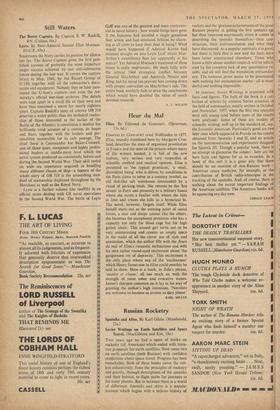Still Still Waters
The Secret Capture. By Captain S. W. Roskill, RN. (Collins, 16s.)
Leyte. By Rear-Admiral Samuel Eliot Morison. (0.U.P., 45s.)
SOMETIMES the Navy carries its passion for silence too far. The Secret Capture gives the first pub- lished account of probably the most important single success achieved by our anti-submarine forces during the last war. It covers the capture intact in May, 1941, by 3rd Escort Group of U 110, together with all the submarine's docu- ments and equipment. Nobody then or later men- tioned the U-boat's capture—not even the Ad- miralty's official war-time archives. The details were kept apart in a small file of their own and have thus remained a secret for nearly eighteen years. Captain Roskill's story of convoy OB 318 deserves a wider public than the technical reader- ship of those interested in the tactics of the Battle of the Atlantic; it constitutes a modest but brilliantly vivid account of a convoy, its hopes and fears, together with the leaders and per- sonalities responsible for its safe passage. The chief 'hero' is Commander Joe Baker-Creswell, one of those quiet, competent and highly profes- sional leaders at middle-piece level which the naval system produced so consistently before and during the Second World War. Their skill rested on wide sea experience acquired in handling many different classes of ship—a feature of the whole story of OB 318 is the astonishing stan- dard of seamanship displayed throughout by the Merchant as well as the Royal Navy.
Leyte is a further volume (the twelfth) in an official series dealing with US naval operations in the Second World War. The battle of Leyte Gulf was one of the greatest and most controver- sial in naval history : how would things have gone if the Japanese had avoided a single grandiose fleet action and had emulated Jellicoe by choos- ing at all costs to keep their fleet in being? What would have happened if Admiral Kurita had steamed straight on into Leyte Gulf where Mac- Arthur's amphibious fleet lay apparently at his mercy? Yet Admiral Morison's treatment of these issues is sadly undramatic. He deals fully with the critical 1944 strategical conflict between General MacArthur and Admirals Nimitz and King, but his naval ties prevent him coming down with proper conviction on MacArthur's side. The entire book similarly fails to draw the conclusions which would have doubled the value of much devoted research.
A. J. WILSON






































 Previous page
Previous page